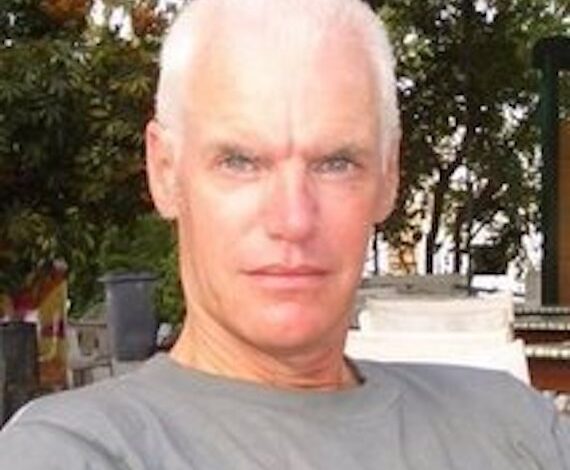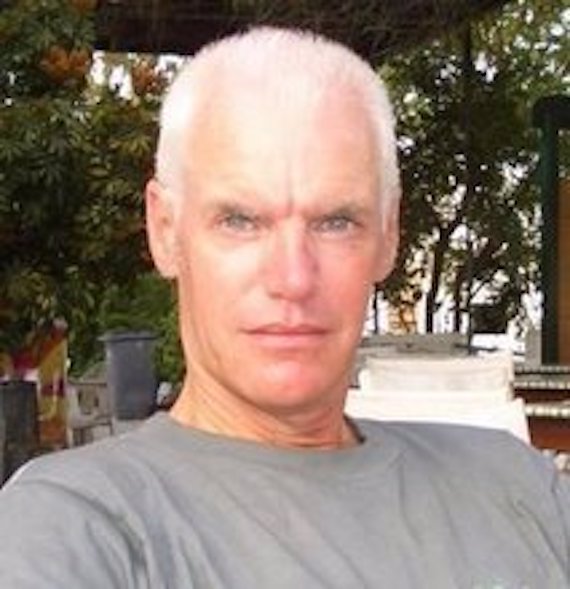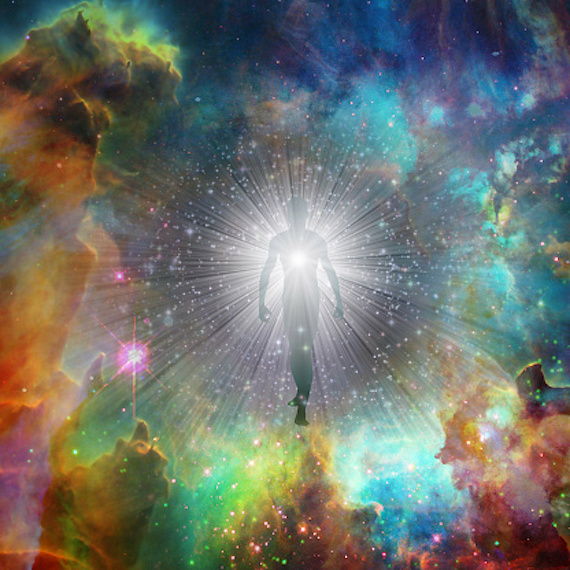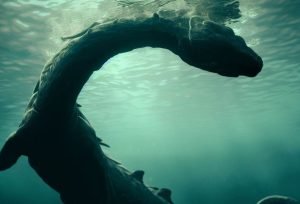The British Author Who Claims He Has Found the Key to the Secret of Life After Death

What happens to us when we die? It is an age-old question that has been pondered by philosophers, psychologists, doctors, and the greatest minds of history. Do we move on to some other realm, are we reborn, or is there simply a vast sea of nothingness and oblivion, our existence erased forever? Despite millennia of seeking the answers to these questions and numerous studies, we are no closer to knowing the truth than we were when our ancestors first had that flicker of conciousness that made them ask these questions to begin with, and it has long been considered one of those elusive conundrums that may forever hide behind the veil of the limits of our understanding. Yet every once in a while someone will come along who claims to have cracked the code and to have gained insights into this timeless mystery, and one of these is a British author who thinks he may have it all figured out.
From since when he was a child, British author Anthony Peake long held a deep curiosity in the universe around him, constantly feeling at the periphery of what he knows, and at just the tender age of 9 he was already questioning what the point of everything was. He got caught up in the world of esoteric phenomena and was reading deep books on all manner of paranormal weirdness such as The Sky People by Brinsley Le Poer Trench, the British series Man Myth and Magic, John Keel’s Project Trojan Horse and Jacques Vallee’s Passport to Magonia while other kids his age were watching cartoons and reading comic books. He became intensely fascinated and obsessed by out of body experiences, near death experiences, and other unexplained phenomena, and by the age of 12 he had a voracious appetite to learn all he could on an eclectic mix of various strange phenomena, religion, psychology, esotericism, and anything and everything that made the universe tick. At university, he specifically chose courses that would accommodate his wide range interests, specializing in the sociology of religion, the theory of language development, and the art of the Italian Renaissance, and he also held a growing fascination with quantum physics and neurology developing over the years.

He would eventually go into business management upon graduating, but his interest in these various unexplained phenomena beyond the periphery of our understanding would not fade, and his main goal was to write a book on it. This is where his intense interest in life after death would have its genesis. In 2000, Peake was fortunate enough to get a sabbatical from his career in business and he finally had the time to pursue his passion of researching and writing the book he had long dreamed about. The problem was, he was not sure of what exactly to write about. It was then that a strange experience would serve as the seed for what would be a sprawling book that would meld together all of his areas of interest, including quantum physics, neurology, ancient myths, altered states of consciousness, the nature of time, déjà vu, alternate dimensions, past life experiences, and the mystery of death into one tome. He would say of this genesis in an interview on the Next Level Soul podcast:
When I had the opportunity to go to university, I decided that I would focus my attentions on the sociology of religion, the sociology of belief, and also that the sociology of ideas. And also I focusing also on religious movements, and in particularly historical ones during this 15/16 century, so I was quite interested in that as well. But I then carried on, you know, did post grad at the London School of Economics and went into business, as as a business manager. But all through my life, I’d always wanted to write books on extraordinary experiences. And I became heavily involved in the UFO phenomenon, abductions, everything else. But it was way back in 1999, I had the opportunity. I done a business contract out in Poland, and I earn sufficient money to take a year out to write a book and my wife was very understanding. She said, Well, if you want to do it, just do it. Take the year out, take a sabbatical and just write the book. So really, literally started on the first day writing the book. And I was sitting there, and I thought, What the hell am I gonna write about, you know, you’re a writer, and you got this blank piece of paper in front of you with a blank screen. And what happened was, I suddenly started sensing, I was going to come down with a migraine attack, and my fingers started going numb, it happens to me a lot, take my fingers starting on my lip start to go numb. And then I had the most extraordinary deja vu sensation that I’d sat in front of that computer screen, the blank computer screen thinking about writing a book. And I thought, That’s it, I’ll write a book about deja vu. Because that is such a common phenomenon. I’ve had it all my life, it’s associated with my classic migraine.
So I started after I came out of the aura state, because I never get a headache, I don’t get the headache, I just get this kind of feeling of disassociation. And I started researching it. And I was amazed to discover the massive links between neurologically between near death experiences, and deja vu, and migraine. They’re all linked to they’re all to do with the same neuro chemicals in the brain. And I then discovered, much to my astonishment, that also linked to this is is something called temporal lobe epilepsy, which is a particularly powerful form of epilepsy where people go into altered states of consciousness, they have their own effective DMT trips. And all of these both migraine, classic migraine, temporal lobe epilepsy, they’re all linked by one thing. And that’s linked to the fact that they all have aura states. And most of the aura states involve deja vu sensations. And that’s how it started.
This would culminate in his book Cheating the Ferryman, which would later be retitled “Is There Life After Death – The Extraordinary Science of What Happens When We Die. The book, which would appear in the Winter 2004 edition of the Journal of Near-Death Studies, the academic periodical of the International Association of Near-Death Studies (IANDS), delves deep into a world of parapsychological topics married with quantum physics and other scientific disciplines. It is all very complicated, laid out over hundreds of pages, but the idea has its foundation on the idea that that the past, present and future all exist simultaneously, meaning that people can enter the future in dreams or the past by déjà vu, and that we are living our lives over and over on a perpetual loop, a version of eternal return similar to what is depicted in the film Groundhog Day. In this scenario, when we die we see a literal minute-by-minute recreation of our life in ‘real time’ as if projected onto a screen from our subjective viewpoint and that this inwardly generated ‘reality’ is virtually indistinguishable from the real thing. In essence, we don’t die, but merely repeat our lives again in a parallel realm of some sort. He has explained of this:
I argue that at the point of death consciousness enters another perceptual reality that exists in a different chronological framework. By this I mean that subjective time is dilated to such an extent that the final micro-seconds are subjectively perceived as a whole lifetime. This time is populated by a rendition of a new life in which the dying person is taken back to their moment of birth in order to live their life again. This is a literal re-incarnation, but not as somebody else, but as themselves. This is similar to a third-person virtual reality rendition of one’s life. I argue that the data needed to create this rendition is uploaded from the quantum vacuum in the roll of zero-point energy, creating a data-based holographic simulation or, as I prefer to call it, an “Instantation”.
Recent research in cosmology is suggesting that at its base level, everything that we perceive as matter is, in fact, created out of information, binary data. This is known as the holographic theory and it relates directly to black holes and the second law of thermodynamics. Consciousness is simply a process by which this data is transformed into a seemingly real, three-dimensional universe of matter. In effect, the vast majority of us are re-living a simulation of our lives, downloaded into our consciousness from the in-formation field. Evidence that we are living our life again comes from such experiences as déjà vu and precognitions. Now this is very important, I further argue that the final micro-seconds of the new life follows the same process and another life is lived in the final seconds of that life …… a reflection of the famous Zeno’s Bisection paradox applied to time. I call this hypothesis “Cheating the Ferryman” (CtF) because we all, in a very real sense, never pay Charon to ferry us across the Acheron! We “cheat” him out of his oboli!

The theory is also heavily based on the idea of parallel universes and many dimensions, and is in some ways similar to the Quantum Suicide thought experiment, which postulates that when you die you merely do so to outward observers in your own timeline, whereas you shift into an alternate timeline where you are still alive. It is much more complex than that, and I have written a whole in depth article on it before, but that’s the basic idea, and Peake parallels this hypothesis extensively in his work. It’s similar to being reincarnated into another world, only you do not come into this new dimension as a new person with no memory of your past life, as in traditional reincarnation cases, but rather as yourself with all of your experiences and memories intact from the reality you left. He also makes mention of what he calls the “daemon,” which is basically our “old” self, who always lives with us and has already lived our present life at least once, our guide in a sense, and is the cause of déjà vu and of the inexplicable premonitions that can save our lives. Peake explains the difference between his hypothesis and reincarnation and the daemon’s role in all of this:
Firstly, CtF is a model of re-incarnation, quite literally to be re-born back in the same body and in the same time. In classic reincarnation the soul is reborn as somebody else in another time and, usually, another location. This new personality has no memories of its past existence, it suffers from what Plato called “Amnesis”, “forgetting”. This new personality starts afresh and, in most cases, lives this new life ignorant of its previous lives. I say in most cases because all the evidence for reincarnation is from the rare individuals who spontaneously (and for seemingly no known reason) have memories of their past lives. These are usually young children who claim to be somebody else who lived before they were born. In recent years a number of adults have recollected “past lives” whilst experiencing hypnotically-induced trance states. I have long had logic issues with this model. I am surprised as to why all people do not have these memories and why, in most cases, they can only be induced by hypnotism. I also have an issue with the fact that this lack of continual memories carried from life to life achieves no purpose. If I do not remember my past lives how do I learn anything from the previous life experiences? There is an English saying, “to learn from one’s mistakes”. The standard reincarnation model precludes this.
CtF has none of these logistic issues. For example, I do not have to explain the transmigration of souls from one body to another, a journey across time and space that cannot be explained in any way by modern science. Similarly, reincarnation is a post-mortem scenario whereby a person continues living even though their body, and brain, has died. CtF takes place in a living brain and has no elements of transmigration. In CtF the location in time and space between the incarnations does not change.
Can circumstances be changed after death? Well, there is no “after death” scenario in CtF. Everything takes place at the point of death and in a living brain. It is also important to stress that each new life is different. In a standard RPG virtual-reality game the environment and back drop by which the game is played is always identical, particularly the initial starting scenario. The game-player finds themselves (or more accurately the game player sees their on-screen (or in-game) avatar in exactly the same location every time a brand-new game is fired up. Remember that the game-player is the equivalent of the Daemon, a consciousness that carries the experiences and learning acquired in previous games to each new game. This knowledge and experience helps the game-player/Daemon negotiate hazards and dangers within the game environment. They “remember” when the hazards and dangers are about to occur and assist the in-game avatar/Eidolon in avoiding them. Now, and this is very important, from the viewpoint of the avatar/Eidolon, these “pre-warnings” of dangers about to be encountered, will seem like precognitions, inklings from somewhere else that danger is nearby. As with a computer game, each decision that is made renders a whole know scenario to accommodate that decision. In effect, every decision creates a new outcome. CtF argues that this is what happens in our many-lives. Each decision we make brings about a new universe that then has its own outcomes. In quantum physics terms this is known as the “collapse of the wave function”, one of the most intriguing elements of quantum mechanics.
In this way CtF also overcomes the other logical inconsistencies of reincarnation. In this model we do “learn from our mistakes” because part of us, our Daemon, carries through the learning experiences encountered in previous lives, and uses this knowledge to improve the new life of its Eidolon. Indeed, a wonderful fictional application of this idea is the movie “Groundhog Day”, in which the hero lives the same day over and over again, and each new day he applies the knowledge acquired in previous days to his advantage. In this regard you may be interested to know that the title of the Russian language edition of my first book was “Groundhog Life”!
This is all a very simplified version of the whole hypothesis, and Peake’s book goes into great painstaking detail and in much more depth on every element of his outlandish idea, yet this is the basic gist of it all. As bizarre as it may all sound, he has even gone so far as to claim that the most important part of his idea has been more or less confirmed by science, of which he says:
I have always been of the opinion that science goes hand in hand with subjective experiences in that it is the melding of both that allow us to make considered opinions about the true nature of the world that surrounds us. It is consciousness that interprets this information, even though the generation of that evaluating (and perceiving) awareness is still a great mystery to modern science. As such both the subjective world of philosophy and religion and the objective world of materialist science are equally important. However, my starting point has always been the science because it adds a degree of objectivity, and it is the science, specifically neurology, cosmology and quantum mechanics, from which I have built the framework of my hypothesis.
The original CtF model was postulated in 2001 and appeared in a peer-reviewed academic paper in 2005, before being published as a book in 2006. Since then, there have been a number of groundbreaking discoveries in quantum physics, cosmology and neurology, all of which are totally supportive of the CtF model. Indeed, I know of no empirical discoveries that contradict the model in any way. I am quite sure that in the next few years yet more discoveries will be made and these will continue to reinforce the hypothesis. But what is of great significance is that the model is also supported by people’s subjective experiences. I have already mentioned déjà vu, but in my books, I discuss evidence from many schools of philosophy, theology and occult beliefs. This is why on fully understanding the model, both scientists and philosophers, agree that I am onto something of great significance. For example, there is some fascinating work being done researching the effects of mind-altering substances known as entheogens at various universities across the world. I believe that it is in this area that the breakthroughs will be made.

It is all very intriguing, but of course there are skeptics of the idea that Peake has somehow figured out the answer to what humankind has been seeking for millenia. Most of his “evidence” is based on personal accounts, and despite his claims that it is all scientifically valid none of it is able to be proiven or out of the realm of pure speculation. The Rational Wiki minces no words when it says of his ideas:
Peake has no education or qualifications in science, he has a bachelor’s in sociology and a master’s equivalent in economics, and admitted his interest in life after death started when he began to research déjà vu after he began thinking on what to write a book on. Peake’s “scientific evidence” is based on personal reports of precognition and déjà vu and none of Peake’s claims have been repeated or tested. Peake has described his ideas as a hypothesis, yet in articles has also described his ideas as a “theory” and “scientific”. He has also contradicted himself on many other occasions. In early interviews he described himself as a materialist and an atheist, yet in more recent interviews he has embraced philosophical idealism, the view that nothing exists outside of a mind. He has also embraced a version of intelligent design and supports the pandeism of Bernard Haisch. In 2012 Peake was interviewed by a paranormal website called skeptiko where he criticised conventional science and also finally admitted that he can actually never prove or test his overall hypothesis (i.e., it is unfalsifiable). He also admitted in the interview that he believes in God in the form of pantheism.
For their part, Skeptiko actually cut Peake, who has now written eight books on the matter, co-authored a ninth, and co-edited a tenth, all of them developing his Cheating the Ferryman hypothesis into ever-wider areas of applications, a little bit of slack. On a subsequent interview they relaxed their initial highly skeptical stance, and the site’s Alex Tsakiris has said:
Anthony, as many of you know, is not just a very accomplished author and speaker, but as someone who truly in every way that I can tell, seems to be a researcher seeker, that is someone who you get the feeling is really trying to get somewhere with this stuff and isn’t just writing books, which are very entertaining and bring us all along on his journey, but that this is really a path of discovery for Anthony, and I really appreciate that. His latest book, The Hidden Universe is no exception. It’s packed, not just with amazing accounts and stories that you’re going to be quite surprised that you’ve never heard about before, but it’s also packed with a lot of cutting-edge science that Anthony believes backs up his theories. Now, one other thing I should mention, and that is that Tony Peake is not someone who’s afraid to stick his neck out there regarding his theories. I kind of like that really, because if you really listen to what he’s saying, I think what he’s saying is not that he has all the answers, but more that, unless somebody sticks a stake into the ground and says, “Hey, it’s not just about stories, here’s what I think this stuff leads to,” unless somebody does that, we can’t really pull it apart. So we all realize that we’re probably wrong about all this stuff that the greatest minds have thought about since as long as there’s been a human being on this planet, but I do appreciate that he’s willing to stick his neck out there and say, “Hey, here’s how I think it all fits together.”
What are we to make of all of these far out ideas? Are they grasping at straws or could he really be onto something? Is there the possibility that there are some answers to be found in all of this, or is it all just wishful thinking and bad science? At the moment, there seems to be no way to really tell for sure, the answer to what happens to us after death just as mysterious as the most far-off planets and the furthest reaches of our galaxy, but it certainly seems like it is a question that our kind will continue to pursue until the end of time, and it is perhaps people like Peake and their earnest search who may illuminate the ultimate path to the truth. Until then, we may very well never know for sure until we ourselves shuck off this mortal coil and venture off into the great beyond.




